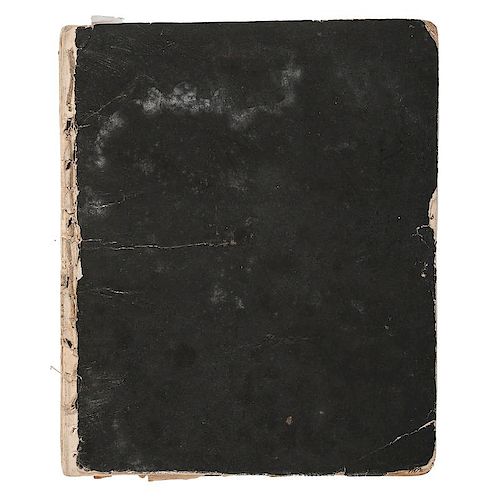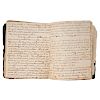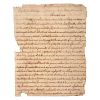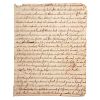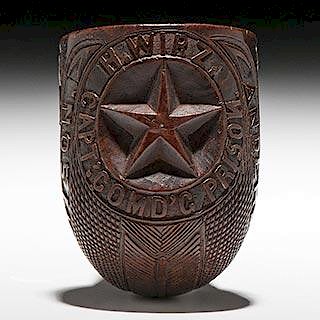Extraordinary Barbary Wars-Era, United States Naval Officer's POW Diary, Ca 1803-1805
About Seller
6270 Este Ave.
Cincinnati , OH 45232
United States
With offices in Cincinnati, Cleveland and Denver, Cowan’s holds over 40 auctions each year, with annual sales exceeding $16M. We reach buyers around the globe, and take pride in our reputation for integrity, customer service and great results. A full-service house, Cowan’s Auctions specializes in Am...Read more
Two ways to bid:
- Leave a max absentee bid and the platform will bid on your behalf up to your maximum bid during the live auction.
- Bid live during the auction and your bids will be submitted real-time to the auctioneer.
Bid Increments
| Price | Bid Increment |
|---|---|
| $0 | $25 |
| $500 | $50 |
| $1,000 | $100 |
| $2,000 | $250 |
| $5,000 | $500 |
| $10,000 | $1,000 |
| $20,000 | $2,500 |
| $50,000 | $5,000 |
| $100,000 | $10,000 |
About Auction
Feb 21, 2017 - Feb 22, 2017
Cowan's Auctions dawnie@cowans.com
- Lot Description
Journal containing approx. 131 pp of descriptive entries written by a naval officer serving aboard the US Frigate Philadelphia during the First Barbary War. In exciting detail, he records his capture and experiences as a POW under the control of a greedy bashaw on the North African coast from 1803 until 1805. The journal reads like a novel with stories of pirates, an intense naval battle, intrigue, love, betrayal, a daring escape attempt, and more. Outlandish as the account may seem, other published works by fellow prisoners confirm almost every detail. This important journal, however, has not been published.
The unidentified author dramatically begins:
Twelve years I have been a wanderer, a solitary wanderer on the earth; separated from life, children, relations, and friends, alone, thou' in the midst of company, and tho', in the course of that time, I have experienced critical situations, reduced circumstances, and the most painful dilemmas…It is an affair of great concern to the publik who, at a future day may require of me as well as of others, an account of it, I feel myself under a kind of obligation to commit to writing…from my memory a circumstantial statement of it: as far, at least as respects the loss of the Frigate Philadelphia and the consequent captivity of her Captain, officers and crew, amounting to one/three(?) hundred and seven persons.
The First Barbary War, also known as the Tripoli War, began as an action against practiced state-supported piracy that robbed the United States, Sweden, and other European traders of its valuable goods. Trade giants Great Britain and France approved of the measures taken by Tripoli and other North African countries because it nearly eliminated competition from other rising economic powers. Thomas Jefferson tried in vain to create a conglomeration of weaker European navies to protect themselves and United States’ ships from attack. Piracy persisted until finally, in 1801, the United States retaliated by raising a navy of six ships to fight against the Bashaw of Tripoli, Yusuf Qaramanli. The frigate Philadelphia was one of the ships built specifically for the conflict, and, in 1803, fell during the Second Battle of Tripoli Harbor. The author of the journal described the event:
On Monday, October 31st, 1803 at 9:00 a.m. being seven leagues to the Eastward of Tripoli…We immediately made sail in chase, and about ten, being within random shot and perceiving [a ship] was armed, began firing on her from the first and second division, larboard side. The chase and fire were continued for about a half hour after which time the deep-sea and hand lead [illegible] were kept constantly going with regular sounding from seven to nine or 10 fathoms: hauling off and on accordingly. About this time, viz: half after eleven, it appearing evident that we could neither run or chase on shore, nor cut her off from the harbor of Tripoli….the Captain ordered to drop the foresail which had been brailed(?) up a little before, and port the helm, with an intention to give up the chase, and haul off shore….but scarcely when the order begun to be executed before we felt the ship touch bottom and gradually rise forward as she ran onto the reef….we now remained a wreck upon the reef; exposed to the constant fire of Gunboats, without having it in our power to shoot.
With no way of defending themselves against capture, the crew furiously tried to salvage what they could from the ship. The author agonized on what he could save: His money? Personal papers? Ship logs? Letters from his children? Love letters from his wife? He put all his gold, amounting to $5900, in a large trunk and left his children's letters in his writing desk. He pocketed 30 doubloons and stuffed his wife's letters in his jacket. After setting his personal affairs in order, he rushed to Captain William Bainbridge's side for additional instructions.
Bainbridge commanded the crew to drill holes in the ship's bottom, dampen the gunpowder, set fire to the sheets, and throw all other weapons thrown overboard before surrendering. The author of the diary described their capture:
About four o’clock in the afternoon…They took possession of the boat, officers, and men and sent them ashore, and soon after the ship was surrounded by all their gun boats, and other small craft. Three persons, seemingly of distinction, came on board; two white men and one black; the last remarkably stout; all of them rather richly dressed in the Turkish, or rather Moorish fashion. Their manners were in some measure answerable to their appearance; and far from being rough or barbarous, were upon the whole, rather prepossessing.
The men took the captain and superior officers to their leader, the bashaw. They were interned in a prison, deprived of every enjoyment of life, mere existence accepted and cut off from all communication with the rest of mankind (January 1, 1805).
Unfortunately, the crew's attempts to destroy the ship failed. Later that month, enemy sailors repaired the holes and used the Philadelphia in battle. Too great of a prize to remain in enemy hands, Lieutenant Stephen Decatur Jr. and a party of volunteers from another ship boarded the Philadelphia under the cover of night, while pretending to be a ship in distress. They boarded the ship and set it on fire while its crew languished in Tripoli.
The author of the journal writes lengthy stories of betrayal, theft, intrigue, and a brave escape attempt that would have succeeded if the rescue boats were in position. Rather than risk their lives, the escapees returned to the prison without raising any suspicion. The journal ends Sunday, June 10, 1805, with a description of an ongoing negotiation between the captain and their warden. A few weeks before the prisoners were ransomed and released. Upon their return, the Navy court-martialed Captain Bainbridge for losing the ship, but absolved him of the charges. They later promoted him to Commodore and US Naval Commissioner.
Supplementary research included with the lot suggests that the author of the diary is Keith Spence. The identification is based on a letter he copies in his journal addressed to Mrs. Spence and son. However, The Huntington Library in California has a collection of Kenneth Spence’s family papers, including letters to his wife during his imprisonment. After further inspection and comparing the handwriting of the journal to Spence's papers, we determined that this is not the diary of Kenneth Spence but another officer on board.
Provenance: N. Flayderman and Co., Inc.The diary remains mostly intact with some damage to the binding, toning of the paper, and a few loose pages.Condition
- Shipping Info
-
SHIPPING. At the request of the buyer, Cowan's will authorize the shipment of purchased items. Shipments usually occur within two weeks after payment has been received. Shipment is generally made via UPS Ground service. Unless buyer gives special instructions, the shipping method shall be at the sole discretion of Cowan's Auctions, Inc.. Cowan's is in no way responsible for the acts or omissions of independent handlers, packers or shippers of purchased items or for any loss, damage or delay from the packing or shipping of any property.
-
- Buyer's Premium



 EUR
EUR CAD
CAD AUD
AUD GBP
GBP MXN
MXN HKD
HKD CNY
CNY MYR
MYR SEK
SEK SGD
SGD CHF
CHF THB
THB